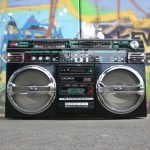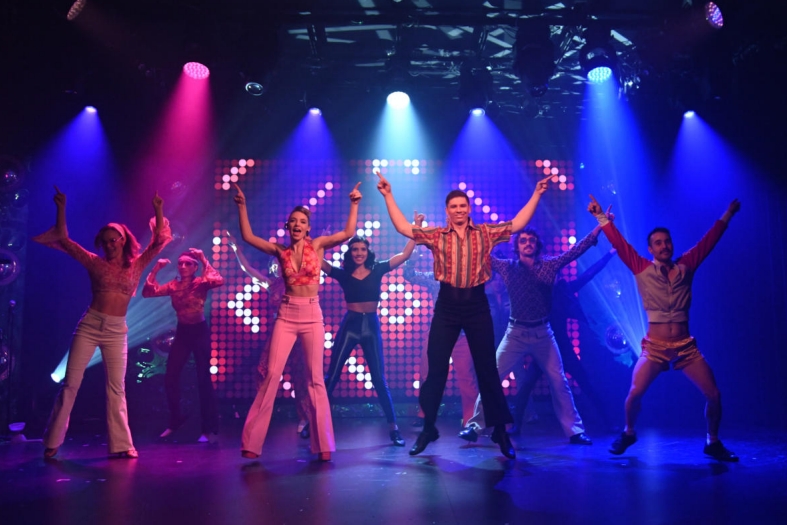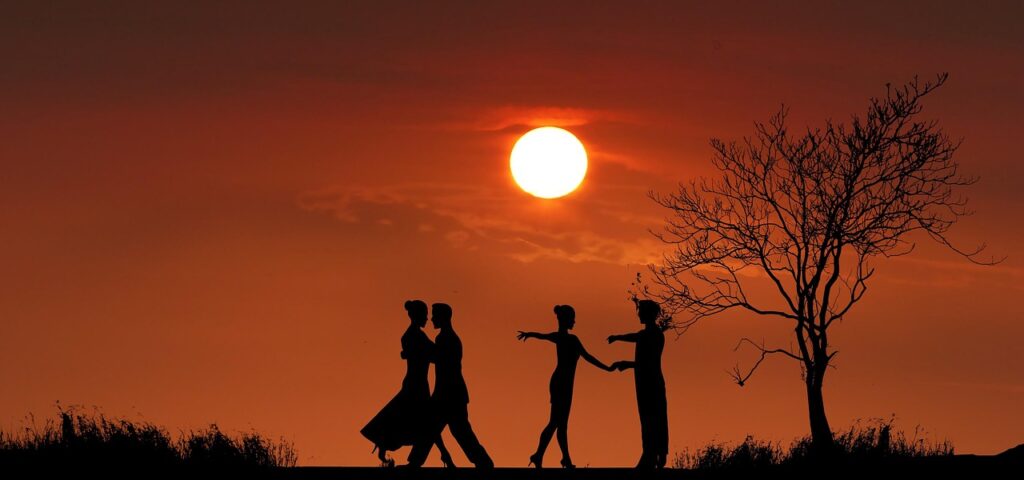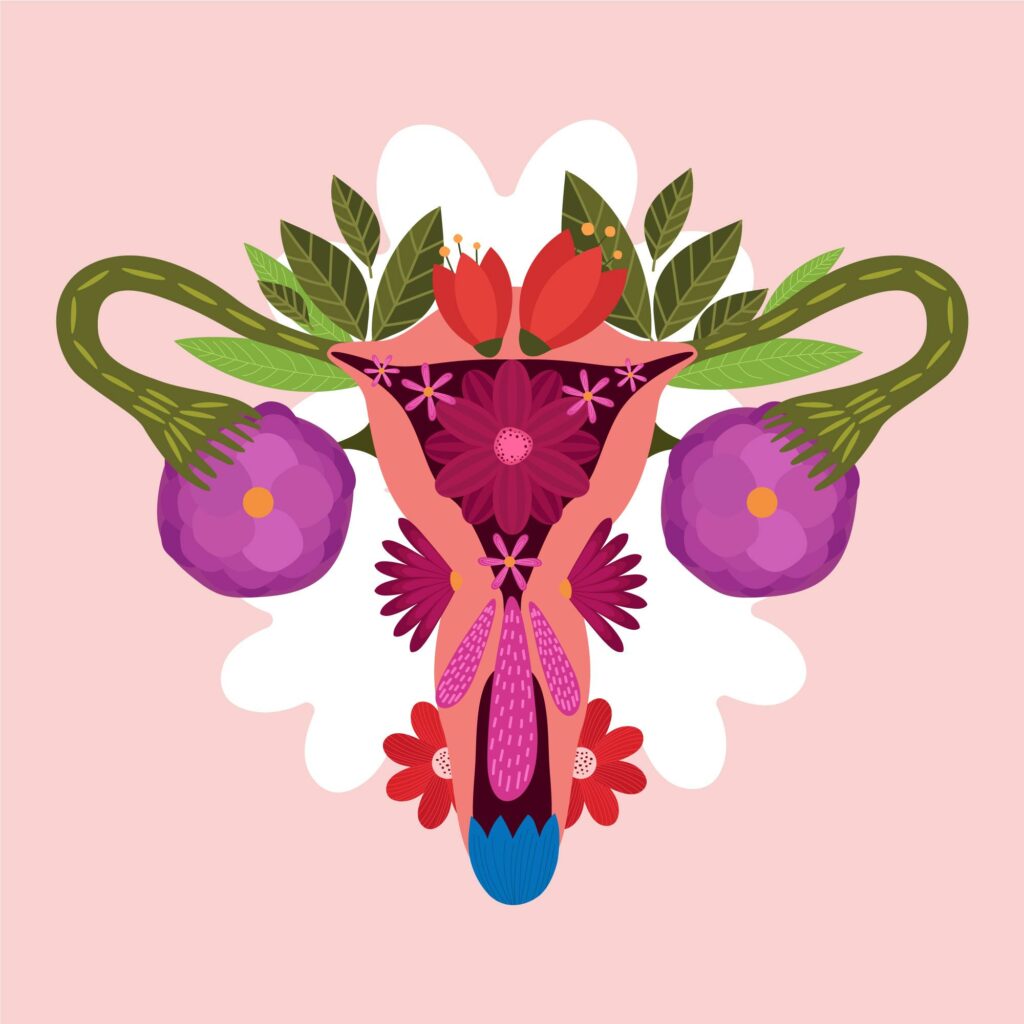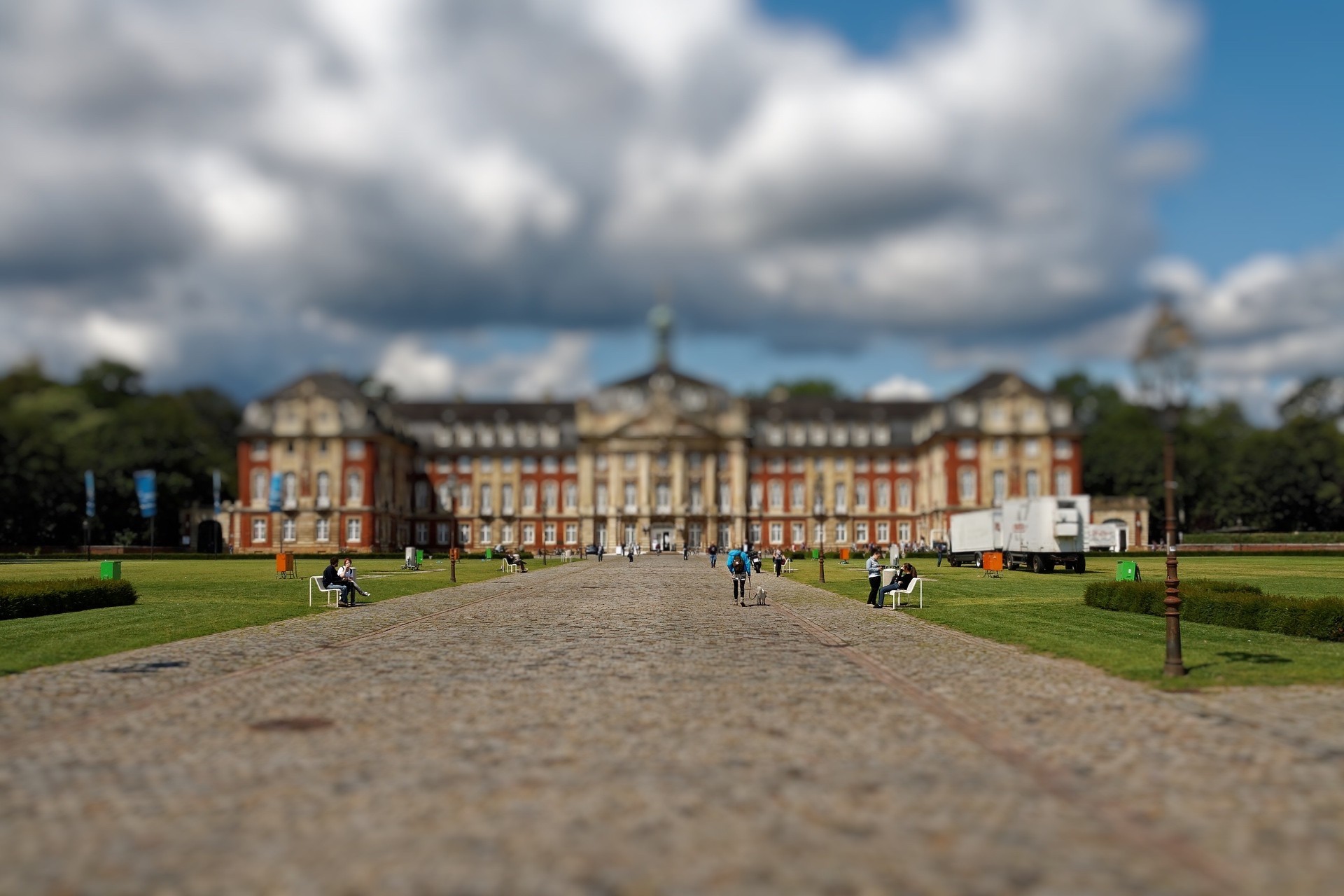Sommer, Sonne, Cassia – Die Band im Interview
Written by Anika Hagen on 21. Juli 2025
Das Trio hinter der britischen Band Cassia beschreibt sich selbst mit den Worten: “tropical vibes but not tropical guys” und damit bringen die drei es auch schon auf den Punkt. Denn die Musik von Cassia bietet mit warmem Indie-Rock und Einflüssen des African-Beats den perfekten Soundtrack für einen unbeschwerten Sommer. Passend zur wärmer werdenden Jahreszeit veröffentlichte die Band am 11. April 2025 ihr drittes Album “everyone, outside” und bringt die neuen Tracks in den kommenden Monaten auf die Bühnen Europas. Unsere Musikredakteur*innen Anika Hagen und Moritz Meyer haben einen kleinen Ausflug ins windige Hamburg gemacht, um dort mit Cassia darüber zu sprechen, wie der Albumtitel zustande kam, wie der Enstehungsprozess von “everyone, outside” war und wie sie den ewigen britischen Winter versuchen zu überstehen.
Anika: Hi, we’re Anika and Moritz from Radio Q and right now we’re in Hamburg in front of the venue Knust and we’re lucky to speak to the band Cassia today. You released your third album “everyone outside” two weeks ago. First of all, congrats on your release.
Rob: Thank you. Thank you very much.
Anika: How has the response been so far online and live on the tour these past few weeks?
Rob: It’s been really good. No, it has been really cool. It feels like people are expecting the new songs more than the old ones, which is really cool. And it’s nice because when we play “miles out”, it’s like you feel the energy there. It’s just really good. It’s been fun, hasn’t it?
Leff: Absolutely sick. Yeah, surprisingly good, to be honest. Like online, obviously all the songs that we’ve been putting out recently have just been connecting, I think, in some kind of way with new people and people who’ve been listening to our stuff already, which is great. And like Rob said, the live shows, when Rob announces the new songs, it’s like getting the biggest screams, you know, which is really cool. It usually takes longer, I think. Usually takes like a year.
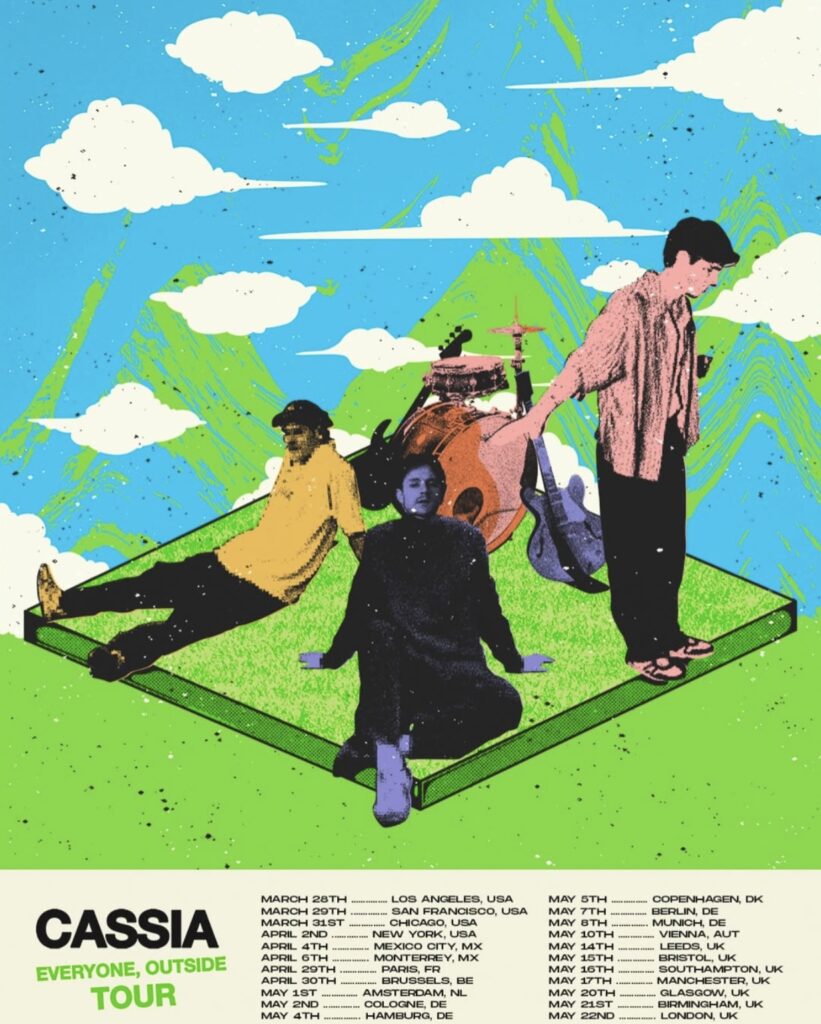
Rob: Yeah, that’s true. I think with our last album it took over. It was a little bit of delay time on it. So it’s quite nice just to sort of get in these venues and play the new stuff and just everyone moving around and things and actually all the shows have been really cool. Like people just dancing the whole night and it’s just a good vibe. It’s a really good vibe.
Lou: I also think people haven’t had the time to learn the lyrics properly yet. So that’s always quite funny. You catch eyes with someone just waffling notes.
Rob: Yeah. When you hit like the second verse and they’re just like *bewegt den Mund in offensichtlich undeutlichen Lyrics*.
Lou: I can’t think of it now, but it was dead funny. I saw what he said and it was just totally wrong. I think it was like, “I don’t need you to look good” or something like that. (author’s note: die richtigen Lyrics lauten eigentlich “I don’t need you to look back”)
Rob: That’s a good one.
Anika: I mean, he tried.
Rob: Yeah, exactly.
Anika: Yeah, but that’s very great to hear. The album title “everyone, outside”. I think it sounds like a call to action, like to go outside and spend your time with somebody. What are your plans for the upcoming summer to fulfill this. Do you have any nice things ahead of you?
Rob: Well, we’ve got a few festivals and then after this tour, I’m going on holiday, it’s gonna be nice. I’m going to Spain in the mountains. I don’t know what else you got, you’re going to Glastonbury.
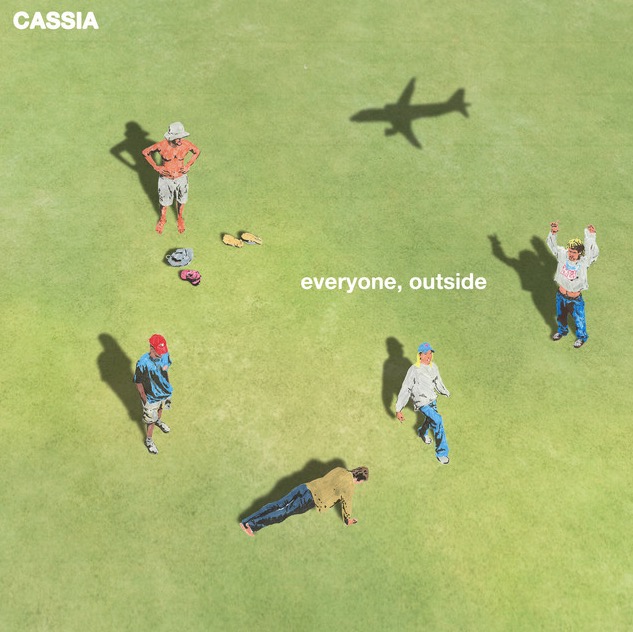
Lou: I am, yeah. Third time in a row.
Rob: Third time.
Lou: So that’ll be good fun.
Leff: I didn’t get tickets and he got tickets.
Rob: That’s funny.
Leff: He messaged me, and he got them on the resale, which is like really difficult to get.
Rob: Well, you got them.
Lou: No, I didn’t get them, a friend got them.
Leff: That was so good. He messaged me afterwards and I was in like a state of deep depression ’cause I just missed out and I never get anywhere either. And he was like, how’d you get on? I was like, nothing today. And he was like, “I got tickets!!!”
Lou: I didn’t say that.
Rob: Nice to rub it in there.
Lou: He pulled a sad face. And said, oh, gutted.
Rob: *macht Lou nach* “I did”.
Lou: Gutted for you, but I’m going.
Anika: Maybe you can still get tickets spontaneously.
Leff: Yeah, I’ll just watch it on telly.
Rob: Exactly.
Leff: Just pretending that I’m outside having fun.
Rob: Just have a tinny. Sit on a camping chair in your front room. Pretend that you’re there.
Leff: Set up my tent.
Rob: Yeah, set up a tent. I don’t know where we went with that answer.
Anika: Yeah, great plants for the summer for parts of you guys.
Leff: You guys are both going on holiday. I think I’ll probably go on holiday at Christmas. I’m planning a big one. Don’t know where, though.
Rob: Nice.
Leff: I’ll just go to the Maldives.
Rob: Oh, wow. Bougie. Very nice.
Leff: Nah, I actually don’t think so.
Anika: Okay, moving on to the next question. Rob, I think you said that the album title turned into this metaphor of, like, embracing your natural self when no one’s looking. Is that something that you guys try to live accordingly to?
Rob: I mean, I say everyone tries to do it, don’t they? It was because we went through a phase of just trying to figure out the album name, which is quite difficult. It was actually Lou’s idea, we were going with “here and now”, basically, which is another track on the album for a long time. And then Lou was like, “it was not really doing it for me. You can’t visualize anything with it”. And then he came up with “everyone, outside” and I think that the overall meaning of that song, you know, you’ll probably be better talking about that is aligned with being your truest self and sort of having those moments. Well, I mean, you should probably explain this.
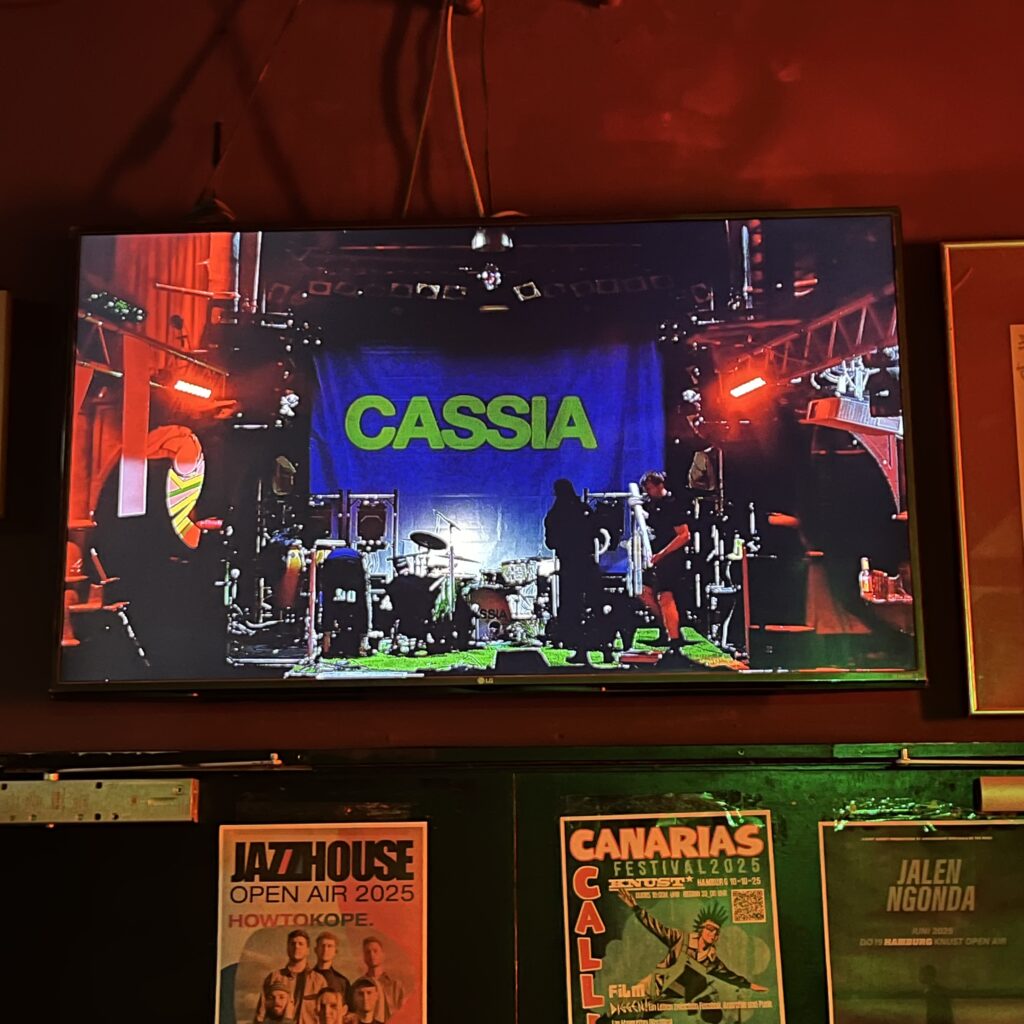
Leff: Well, that kind of like, materialized over when it was the album name and when you kind of listen to the rest of the songs in that context, because this song originally was literally just as basic and it’s kind of like an ironic, sarcastic, semi irritated song, because we were writing our album and I think it was like a really gorgeous sunny day. And I was kind of just like, I just want to be outside. And then it kind of just got me thinking about how when you’re trying to make yourself feel good and positive and get your mental health in check, I tended to do the weirdest methods going, like, weird breathing, ice baths, doing all sorts. And then when you actually just spend time in nature and do the basics and stuff, you feel way better. And it does, like, 80% of it. So it’s kind of about that. And then when we spoke about it more, we kind of found that it had more layers to it and that it could be wider and deeper.
Rob: You kind of put your own stamp on it, can’t you? And it seems to fit with the rest of the album as well, really nicely. When you listen to it down and you have that title in front of you, it just sort of worked.
Leff: Yeah, we’d spoken about the outside thing as well.
Rob: Yeah, when we were producing it up, we were thinking, like, oh, it’d be really nice if some of these songs make you feel like you’re in a certain place or whatever. And, yeah, lots of bird noise, we ended up reusing that quite a bit.
Leff: Album sponsored by “Splice”.
Rob: No, yeah “Splice – Bird Noise”. But that was a big goal, wasn’t it? So I guess it was a little bit of a full circle moment, when Lou gave us that idea for “everyone, outside”. It was like, wow, this fits really nicely. We didn’t have to think about it very much, it was like, yeah, that’s cool. Whereas I think album title names, they’re always quite difficult to get right because it’s more just about the feeling for us anyway. It’s not about how fancy the words are or whatever. And I think you can kind of get stuck in that thing, can’t you? So it’s quite nice and simple.
Lou: You know, when it’s good. When everyone goes, oh, yeah, that’s a good one.
Leff: It was a eureka moment a little bit. He said it while we were having a coffee. We were sat across the table like this. So we were thinking of visual album ideas, because all the ideas we were coming up with were crap and he was like, “what about “everyone, outside””? And we stared into each other’s eyes for some time.
Lou: It’s one of the moments, where you’ve been working on the other thing for too long. And you’re like, is it too late?
Leff: Yeah, we were scared to say it on our chat with our manager because we thought we were gonna get in so much trouble for changing it this late.
Rob: And then the guy who did the artwork had done so many iterations at this point that we were like, a name change is not really gonna go down well.
Lou: But I think it’s good to do that, because I think everything then came together quite quickly after that. And it probably would have taken longer had we not have changed it, maybe.
Rob: I think it probably would have just not been as good. I think that’s the thing. As soon as we put it in, I was like, oh, that’s a great idea. Let’s just go with that. It’s cool. I’m very happy that we decided on “everyone, outside”.
Moritz: So would you rather consider yourself as outside side guys? Because, for example, on your Instagram, I see in Berlin you were doing some street music. So how did that go? And do you do this more often?
Rob: When we first started the band, we used to go down to Cornwall and busk, like, for a long, long time, like over the summers, basically. And so I think that doing things like that is just a little bit of a nod to what we used to do back in the day. And it was quite nice doing that there because we obviously lived in Berlin for two and a bit years. So going back sort of feels like a second home and it was good fun, wasn’t it?
Leff: Yeah, it was nice. We did this thing where, like, people walked on the grass backs, we’d start playing. If they stopped doing that, we stopped immediately. And that was actually kind of amusing just because people were kind of trying to figure out what the hell we were doing for about 45 minutes before they realized, and then people would, like, get on and dance and things. And that was quite cool.
Rob: Yeah, it was funny.
Leff: But you’re probably the most outdoorsy, I’d say, out of the bunch of us. I think most of it’s dreams of being outside.
Rob: We don’t come from a particularly sunny place. So the chances of going outside are very few and far between. So yeah, you do have to do a lot of imagining.
Lou: There is some nice countryside, though, in Macclesfield where we’re from. Really nice.
Rob: Oh, yeah, Castleton.
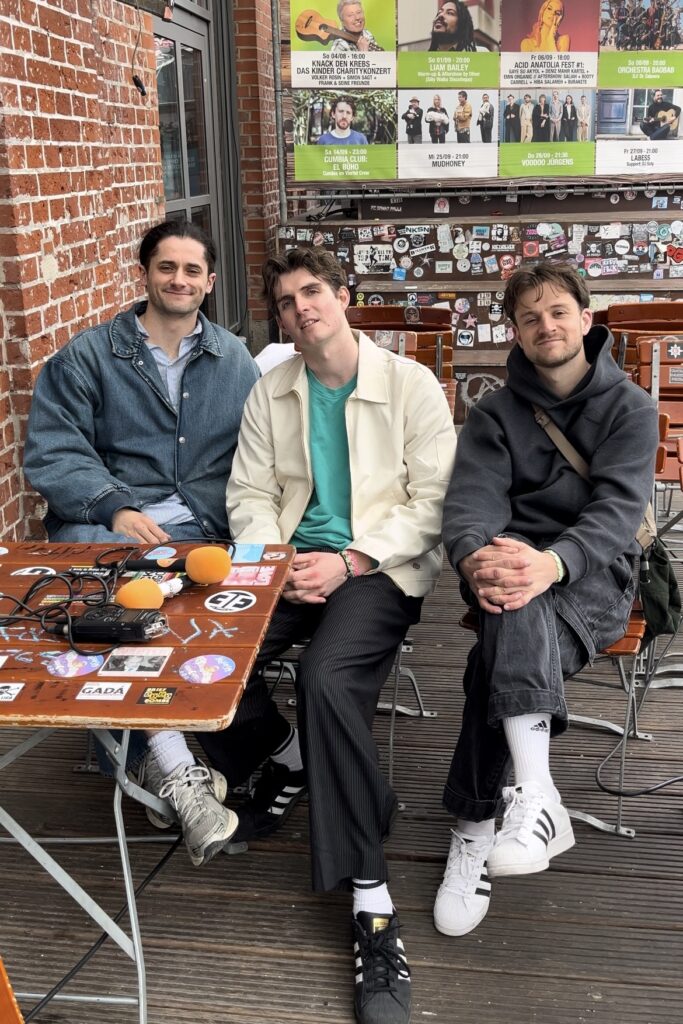
Lou: Get out there. Yeah. I don’t really like spending too much time in one place, like, especially indoors. You can sort of disconnect from the world in a way, especially when you’re like doom scrolling for hours. I tend to get very sad after those things.
Moritz: I think your music is the perfect soundtrack for summer. Is summer your favorite season?
Rob: I’d say so, yeah. It’s much nicer. You know, everyone’s very happy. But I guess if you didn’t have the winters, then the summers wouldn’t feel so good. I don’t know. I always think if you live somewhere that’s permanently sunny, would you always see it that way? I think I probably would.
Leff: Everybody’s happy all the time. More than half the time.
Rob: Constantly happy.
Moritz: Okay, that’s good. So, for example, with your very summery music, do you have any tips on how to survive the winter? Or what do you do?
Lou: Just see it out, man, bunker down, don’t come out and wait for the sun to come up again. That’s what I do anyway.
Rob: That is probably good advice.
Lou: Just try not to go insane. It’s so dark. Like, I mean, it’s the same here, but, especially this year. I think it was so wet and rainy for so long. I was like, I don’t think the sun’s ever going to come out ever again.
Rob: It did last a long time.
Lou: And then we went to America and it was perfect. Just what we needed.
Moritz: Is this where you filmed your videos as well? So, for example, for the new track, which was out there, you were walking through New York in the video, didn’t you?
Rob: Oh, right, yeah, we did. Well, we just kind of thought it’d be a good idea whilst we were there to sort of get something and Jake filmed it. We weren’t going to do it originally, we were just walking around, it was sunny so we were just trying to get something short for “everyone, outside” and then we were like, we should just do the whole thing.
Leff: It was really spontaneous.
Rob: Yeah, it felt like it was. And it really suited the sound of the song because we kind of just put the headphones on and the whole landscape just really fits very well with that sound. I don’t know.
Leff: It just came together. Like you were wearing a cool coat and these weird headphones. It was really enjoyable, actually. It made us think about a new way of doing music videos because obviously sometimes if you’re with labels you’ll be paying, like 10 grands or something for a video. It’s like the tone of it is not quite right. Like it’s all shiny and cool, but it doesn’t quite match the feeling of the music. And so when you make it yourself and you edit it yourself, at least to us, it matches the vibe. It cost me 50 quid.
Rob: That’s what I mean.
Leff: The camera cost 50 quid and the the shoots, you know, were free. So honestly, great. Really.
Rob: I really like doing that. It’s just fun. No pressure.
Anika: Now that you’ve created your third album, how did the writing process challenge you in comparison to your first two albums? Was there anything surprisingly easy or hard while working on “everyone, outside”?
Rob: I’d say it was the easiest album we’ve made, just purely because we were having a good time. There was no time pressure. And I think with past albums, we maybe have felt that before, but this time around, we were like, we’re not doing that again. We’re gonna make it. And then if we’re not happy, we’re gonna carry on until we’re happy. And I think that through producing the last album, we learned a lot through doing that, and kind of changed. Well, we didn’t change the way we did it, but I guess we changed our mindset towards experimenting with different things. We were a bit more free with how we just make music. It was especially like recording drums or something like that, that used to be a big thing. Now it’s just two mics and it kind of works. And it’s like recording a guitar, we treat it like that. And I feel like you can only get to that point, having tried to do it, we just learnt a lot.
Leff: You understand what’s important about music ultimately. Or at least to us, which is like, does it feel good? I think maybe in the past we could have gotten a little bit too in the mindset of that there’s probably a right way to do this that we don’t know about. So you just stress over it, it has to be correct or something. But this time it was just like, it feels good to us, so who cares?
Rob: Yeah, and the guy who mixed it has been billing basically for free. He had the same philosophy as if something works, it just works. Not like, let’s analyze this to death and figure out why it’s out of time or the drums don’t necessarily work with the bass when soloed. It’s like if everything works together, then it’s cool. And I think that was a nice thing to go for. Well, it was nice because it always felt very casual. It didn’t feel like we were battling against stuff very much, which was good.
Leff: We mentioned like the mental side of things. I feel like we’ve learned with songwriting, because there’s like two phases there, recording the album, there’s like songwriting part of it with the songwriting. But that can often be a little bit more torturous because, you know, you’ll spend all day in a room and maybe you won’t get a song that you like or whatever. And I think we’ve really grown to understand how each of our minds work in that regard. And you get better at living in that space of not being hyper productive because it can’t always be a hyper productive time. It’s not like just checking things off a to do list. You just gotta be there and hope that you come up with something cool. And I think we’ve got a lot better at understanding that.
Rob: Yeah, it’s just accepting that you’re going to be in there for a long time, basically. So it’s the only thing you can do.
Anika: Yeah, I mean, it makes sense that it gets just a bit easier over time.
Rob: I don’t think it ever gets easier. I’d say the acceptance of being there is more there. When you first write songs, you’re like, maybe I’m just not cut out for this, everyone else is writing great tunes. Like we wrote like 60, 70 tunes for this album and then whittled it down. So it took a long time to figure out what it is we wanted to do and yeah, you just got to write tunes.
Anika: Now that you just touched upon the track list, do you still remember with which song you started creating the record, if it made it onto the track list? And did it already set the foundation for the album? Or would you say that you went into a different direction from then on?
Leff: We definitely had an anchor point. I think it was like, five songs that we picked out of the first stint of writing that. It wasn’t so much pressure. We’re just like, let’s just do these and see what happens. I think it was “antidote”, “awake”, “western front”, maybe “friends”.
Rob: Yeah, I think “friends”, wasn’t it?
Leff: What else was there?
Rob: We tried another one we ended up not putting on the album, which was “MIA”. Yeah, that’s kind of how we did it, didn’t we? It didn’t work then so we just sort of left it for a bit and pick it up later.
Leff: But you just kind of follow what excites you. I remember those songs,where there was something in them that was like, there’s something cool. Like, the instrumentation, production already is cool. And it was just exciting. And then the album just grew naturally out of that. And we went to Mexico, that was quite important. We had a big kind of experience there, watching our favorite bands play this huge festival stage. And we were like, it’d be great if the songs could really translate in that environment. So that was quite a big thing. We just don’t think too hard about it and just do it and hope for the best, really. The more you think about it, the more you can kind of analyze it and break it, it gets a bit too cerebral. So if you just have a crack, it usually comes out all right, doesn’t it?
Anika: Yeah. I guess you have to trust the process in a way.
Leff: Trust your intuition. If you’re feeling great about this, then just go with that. Don’t try and think, “but is it really good?”, that’s a killer.
Anika: You’ve been on tour for some time now, and you’ve been on a few tours in the past already. What’s the learning that you take away from all of this? Did your tour and show preparations change and improve over time?
Rob: Yes, I’d say this is probably the first tour where we’ve really done things the right way around. Because in the past we went through a stage of just doing back to back tours and it was just hard to keep up whilst trying to also write music and record it. And it was like doing everything all at once and it’s just a recipe for panic, a little bit chaos. We managed to figure it out but this one was nice because we recorded the album, finished it and then went to rehearsals and tried to figure out how it’s gonna translate. I think through doing that people just sort of know, they just get it. With all these shows that we’ve played so far, people just start dancing immediately and it’s so gratifying. It feels really cool, doesn’t it? And yeah, I’d say it has changed.
Leff: We’ve got a bus.
Rob: We’ve got a bus now for the first time, that’s also nice.
Lou: We can sleep through the night. It’s a game changer, it really is. And then we’ve just got just such a good crew with us this time. Usually we have a sound guy and a tour manager. Now we’ve got a content person and tech, which is great and he can do like everything. So it’s made the whole process a lot smoother for us and we can just focus on the show and those guys are taking care of all the shit that we don’t want to take care of. They’re so good at it.
Rob: It’s nice to have someone photographing the stuff as well, because I think that’s where we’ve fallen down in the past, it costs quite a lot, but it’s so good to have some documentation of what you’ve done and because we’ve been on these extensive tours in the past and played like crazy gigs and stuff and there’s only a few phone photos or videos. It’s just great to have someone doing that every night. It’s really cool. So we’re very lucky that we’re in that position to be able to have all these great people around us. So, pretty cool.
Anika: Yeah, I can imagine. Do you have a favorite part of being on tour?
Rob: I really like when you had a great show and then you finish it. It’s such a nice feeling, like, to have a great one and then just sort of get off and be like, that was really good. I don’t know, it’s hard to describe. It’s not the finishing of the show that I look forward to. It’s like doing a great one and then sort of having that minute off and being like, that was so good.
Leff: I’m really enjoying the gigs as well, because the way we’ve done it in rehearsals, it just runs. That’s like a full show. So it’s not like we’re just playing song. Everything’s built a certain way and I think that really suits us because there’s no like, “what’s gonna happen?” You just know what’s going on. So I’ve really enjoyed the shows, because it’s very consistent. We’ve put everything we can into making the show as good as we can. I feel really confident and I’m not worried if people will like it because we’ve tried and we’ve left nothing on the table. We couldn’t have done anything more to make it better in the time we had. The only times I feel a bit nervous is when I feel like I could have probably tried to make this better.
Rob: Prep more, yeah.
Leff: And whereas we’ve just gone full send, these guys are like Daft Punk half the time, playing keyboards and synths and stuff. It’s great. So I’ve been really enjoying that.
Moritz: Okay. So you have played a few shows now in Germany. Do you have a special highlight from a show here in Germany that you remember?
Leff: There’s been loads. German crowd’s are awesome.
Rob: Yeah.
Leff: Cologne the other night was sick.
Rob: That was really good.
Leff: That was probably the best. It was first German show on this run, but it was sick. Hamburg last time in Molotow was small, but the energy just blew the roof off.
Rob: Yeah, it was absolutely mental.
Leff: It was one of the shows that stick in your mind. It was so good. So I’m hoping high tonight with the bigger venue. I feel like the energy will come again. Hamburg’s a good crack. It feels like the north of England. Like the further north of England you go, Glasgow in Scotland as well, people get a bit rowdier and are a bit more up for it. And I think that Hamburg’s a little bit like that from our experience.
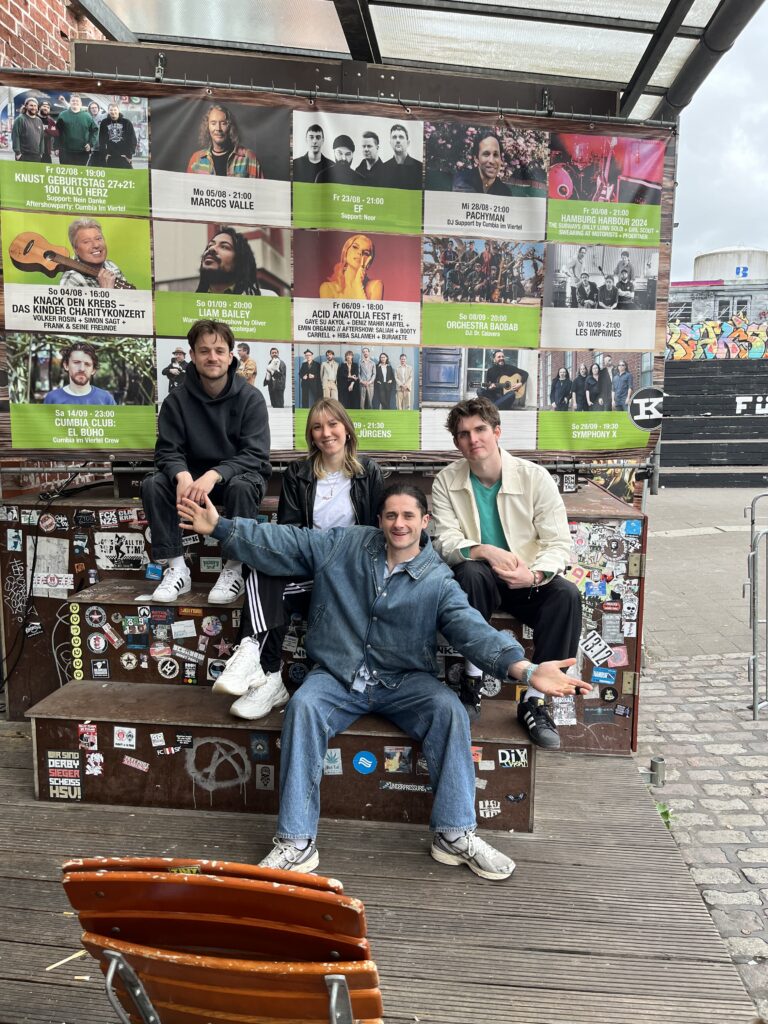
Rob: That’s true.
Moritz: Okay then, let’s see how the show is going to be. Actually, you told me you were living in Berlin. I think I met you in an interview six or seven years ago and you told me that you were learning German. So how are you doing?
Rob: Oh, sprechen Sie kein Deutsch, I cannot speak. I can’t remember any, genuinely. When someone says, “speak German”, I’m like, “I have no idea”. I can sort of understand a few things that people say. The one thing I found really difficult about German is that it just switches constantly and the “der, die, das” thing is really complicated. And I found out that there’s two different ways to say the word quiet today, you know, like “leise” and there’s another way to say it if it’s quiet in the street or something like that. Whereas in English it’s like the table, the chair, you know. I think that’s going to take me a bit of time to figure out, but I’m hoping that I can one day speak it. I don’t know, kind of funny. I’m going to keep trying.
Leff: He definitely got a lot better, like from when you started. I heard him on Duolingo the other day.
Rob: I’m just keeping my streak at the moment, trying not to lose that whilst we’re on tour, it’s 200 days. I’m quite happy with that. So we’ll see.
Moritz: And the last question is, have you discovered any recent music that you can recommend?
Lou: I’ve been very into the new Djo album. I don’t know if you’ve heard of him.
Moritz: The one from Stranger Things, yeah.
Lou: I got very, very into that. Very into it.
Leff: He’s been obsessed, actually. He’s got posters of him all over his walls.
Lou: So, that was good.
Leff: This was back when he was much smaller on, he’s massive on spot for now, but Rob showed me Pale J, which has been an absolute mainstay for me just ever since he showed me that. I loved that. And there’s a band called Gabriel’s. I think they’re from New York.
Rob: Yeah, they’re really cool.
Leff: They’ve got a song called “Blame”. Every now and again you come across a song where it’s just like, “whoa”, it just speaks to you.
Rob: He’s got a crazy voice.
Leff: It sounds like an old Ella Fitzgerald, kind of, like 40s soul singer. It’s amazing.
Rob: I don’t know, off the top of my head, anything recently. I’ve not really been listening to loads of music recently, to be honest. I just kind of go through phases of what I really enjoy about the tour stuff, which is just walking around. But Zach is obviously really cool, he’s supporting us. He’s really cool, actually. He’s got great voice. His new stuff’s sick. I really like it, because he was like, oh, I’m a bit nervous about that. But it’s the best stuff he’s got. The melody’s really cool. And when we were doing the album, I listened a lot to Peter Bjorn and John. That album’s really cool. I listened to a bit of Klaxons again, which is nice. I was sort of going through what I used to listen to as a kid, which is kind of fun. Bit of Bombay Bicycle Club again. I really like them.
